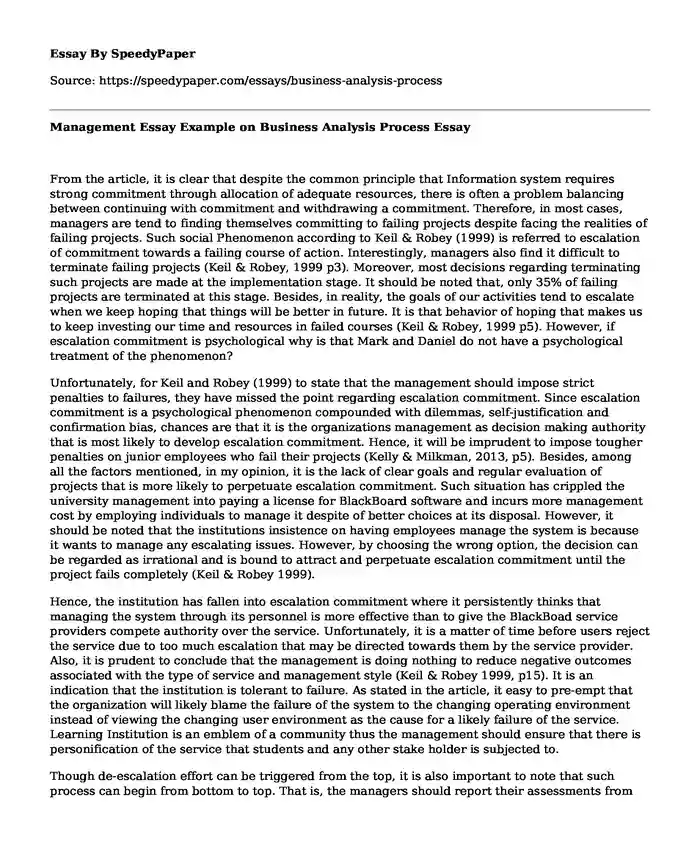
| Type of paper: | Essay |
| Categories: | Management Business Information technologies |
| Pages: | 4 |
| Wordcount: | 826 words |
From the article, it is clear that despite the common principle that Information system requires strong commitment through allocation of adequate resources, there is often a problem balancing between continuing with commitment and withdrawing a commitment. Therefore, in most cases, managers are tend to finding themselves committing to failing projects despite facing the realities of failing projects. Such social Phenomenon according to Keil & Robey (1999) is referred to escalation of commitment towards a failing course of action. Interestingly, managers also find it difficult to terminate failing projects (Keil & Robey, 1999 p3). Moreover, most decisions regarding terminating such projects are made at the implementation stage. It should be noted that, only 35% of failing projects are terminated at this stage. Besides, in reality, the goals of our activities tend to escalate when we keep hoping that things will be better in future. It is that behavior of hoping that makes us to keep investing our time and resources in failed courses (Keil & Robey, 1999 p5). However, if escalation commitment is psychological why is that Mark and Daniel do not have a psychological treatment of the phenomenon?
Unfortunately, for Keil and Robey (1999) to state that the management should impose strict penalties to failures, they have missed the point regarding escalation commitment. Since escalation commitment is a psychological phenomenon compounded with dilemmas, self-justification and confirmation bias, chances are that it is the organizations management as decision making authority that is most likely to develop escalation commitment. Hence, it will be imprudent to impose tougher penalties on junior employees who fail their projects (Kelly & Milkman, 2013, p5). Besides, among all the factors mentioned, in my opinion, it is the lack of clear goals and regular evaluation of projects that is more likely to perpetuate escalation commitment. Such situation has crippled the university management into paying a license for BlackBoard software and incurs more management cost by employing individuals to manage it despite of better choices at its disposal. However, it should be noted that the institutions insistence on having employees manage the system is because it wants to manage any escalating issues. However, by choosing the wrong option, the decision can be regarded as irrational and is bound to attract and perpetuate escalation commitment until the project fails completely (Keil & Robey 1999).
Hence, the institution has fallen into escalation commitment where it persistently thinks that managing the system through its personnel is more effective than to give the BlackBoad service providers compete authority over the service. Unfortunately, it is a matter of time before users reject the service due to too much escalation that may be directed towards them by the service provider. Also, it is prudent to conclude that the management is doing nothing to reduce negative outcomes associated with the type of service and management style (Keil & Robey 1999, p15). It is an indication that the institution is tolerant to failure. As stated in the article, it easy to pre-empt that the organization will likely blame the failure of the system to the changing operating environment instead of viewing the changing user environment as the cause for a likely failure of the service. Learning Institution is an emblem of a community thus the management should ensure that there is personification of the service that students and any other stake holder is subjected to.
Though de-escalation effort can be triggered from the top, it is also important to note that such process can begin from bottom to top. That is, the managers should report their assessments from the users feedback. Apparently, it is impossible to expect suggestions that may jeopardies the business from the Black Board provides. That is, Black Board will unlikely suggest to the institution to abandon its service for another one. Just like Blackboard, the institution is focusing on the outcome of its projects instead of the escalation issues involved. Also, instead of embracing the user environment as the consequence for the project failure in the near future, it is predictable that the institution will likely perceive this as the cause of its failures (Wong & Kwong, 2007, p57). Moreover, it should be noted that the institution has developed wrong de-escalation process by allowing escalation issues to be directed to the service provider instead of the management. By detaching the management from the issues, I think escalation commitment by the institution is likely to be prominent (Keil & Robey, 1999 p, 15). Another major factor that influences the institution is as stated in the article is the expensive process of switching from one service provider to another.
References
Keil, K. & Robey, D. (1999). Turning around troubled software projects: An exploratory study of the deescalation of commitment to failing courses of action. Journal of Management Information Systems 15(4). pp. 63-87.
Kelly, T. F., & Milkman, K. L. (2013). Escalation of commitment.Encyclopedia of Management Theory. Thousand Oaks, CA: Sage Publications, Inc.
Wong, K. F. E., & Kwong, J. Y. (2007). The role of anticipated regret in escalation of commitment. Journal of Applied Psychology, 92(2), 545.
Cite this page
Management Essay Example on Business Analysis Process. (2019, Nov 06). Retrieved from https://speedypaper.com/essays/business-analysis-process
Request Removal
If you are the original author of this essay and no longer wish to have it published on the SpeedyPaper website, please click below to request its removal:
- IT Essay Example: Wireless Service Technologies in Internet America
- L'Oreal and Globalization, Business Essay Example
- Case Study Example for You: Motivation and Leadership Strategies
- Free Essay on Team Performance, Productivity, and Rewards
- Essay Sample on Literature Review for the Program
- Free Essay Example on Psychosocial Problems
- Paper Example: Roseola Infantum
Popular categories




